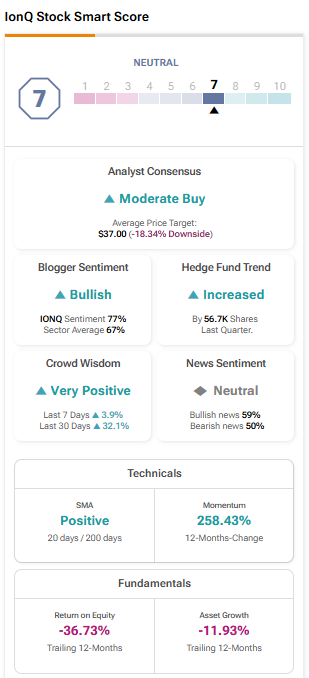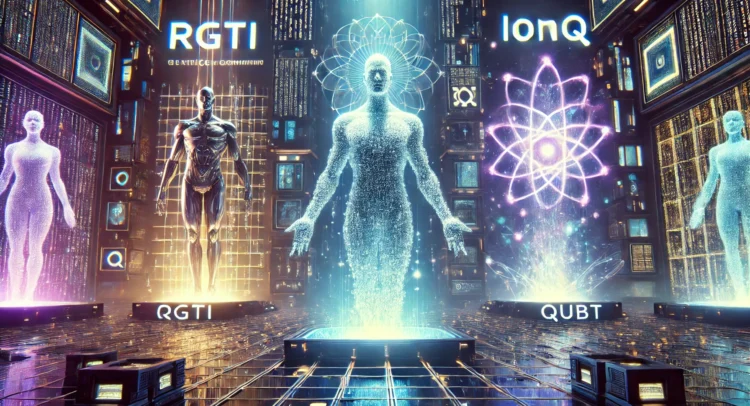Quantum computing is one of the hottest fields right now, with over a hundred companies around the globe aspiring to develop the first commercial quantum computer, whether that be a pure quantum computer or a hybrid one. Up until Google’s (GOOG) reveal of the quantum chip ‘Willow,’ the industry went under the radar, but from then on, the quantum industry as a whole has spiraled and attracted vast interest from the public and investors alike.
Elevate Your Investing Strategy:
- Take advantage of TipRanks Premium at 50% off! Unlock powerful investing tools, advanced data, and expert analyst insights to help you invest with confidence.
Among the ample collection of companies, a few smaller players have gained greater interest than others, mainly due to their technological progression. We’ve decided, then, to examine three of the more talked about: IonQ (ION), Quantum Computing Inc. (QUBT), and Rigetti Computing (RGTI).
We’ll explore their valuations, tech achievements, financial health, and potential to decide who has the better fundamentals for future success.
IonQ: The Biggest Among the Small Ones?
IonQ is a big name in the quantum world. Its market cap is almost $10 billion, and it’s clear that investors have high hopes for the company. IonQ has made some impressive strides, especially in quantum networking. They’ve achieved remote ion-ion entanglement, a big deal for scalable quantum systems. Its IonQ Forte, with 36 algorithmic qubits, is also surprising people in the industry.
Financially, IonQ is solid. It had $382.8 million in cash and cash equivalents in Q3 2024, which gives it financial stability in the long run. It also finalized a new contract with the U.S. Air Force Research Lab worth $54.5 million. Tipranks’ Smart Score is rated as a seven, meaning a neutral rating going forward. Despite strong investors’ confidence, the company is not making any profit and is probably some distance away.

Quantum Computing Inc.: NASA’s in the House
QUBT is another company gaining a lot of attention. It focuses on both quantum software and hardware. QUBT has a market cap of about $1.50 billion and has seen its share, considering it is a quantum stock; QUBT stock scores a beta of 1.28, so there hasn’t been considerable volatility so far. Moreover, its stock skyrocketed 1176% in the last year, and it gets a 9 rating on Tipranks’ Smart Score going forward.
One of its big wins was securing a contract with NASA for its Dirac-3 entropy quantum optimization machine. This tech is designed to tackle complex imaging and data processing challenges. QUBT’s financials are a bit more modest. It raised $7 million in Q3 2024, bringing its cash flow to $3.1 million. The company’s revenue for Q3 2024 was $101,000, with a total of $386,000 for the last twelve months. Despite these numbers, its strategic contract with NASA shows that QUBT has potential.

Rigetti Computing: Going for a Hybrid
Unlike the companies above, Rigetti is going for hybrid quantum-classical systems. It has a market cap of about $3.39 billion, and Rigetti is making significant progress. The company’s latest achievement is a 40-qubit quantum processor integrated with classical computing resources, which boosts performance. Rigetti recently secured $50 million through a private placement and focuses on securing contracts and partnerships to drive growth. Meanwhile, RGTI scores an 8 on Tipranks’ Smart Score, indicating strong analyst consensus.

To better understand the stocks’ outlook, a comparison chart for your enjoyment.

Conclusion
So, who has the best potential for success? IonQ seems to be slightly ahead of the other two. Its financial health, technological achievements, and strong investor interest stand out. While QUBT and Rigetti are making impressive strides, IonQ’s seems a bit more complete, as of now. It’s still early doors, and on paper, all of the three have vast potential for success. Either of them will not be profitable in the next two years. Still, a possible route for income might be from the technological inventions that will pop up along the way and derive from the progress made towards the first quantum computing, like QUBT’s contract with NASA.
















